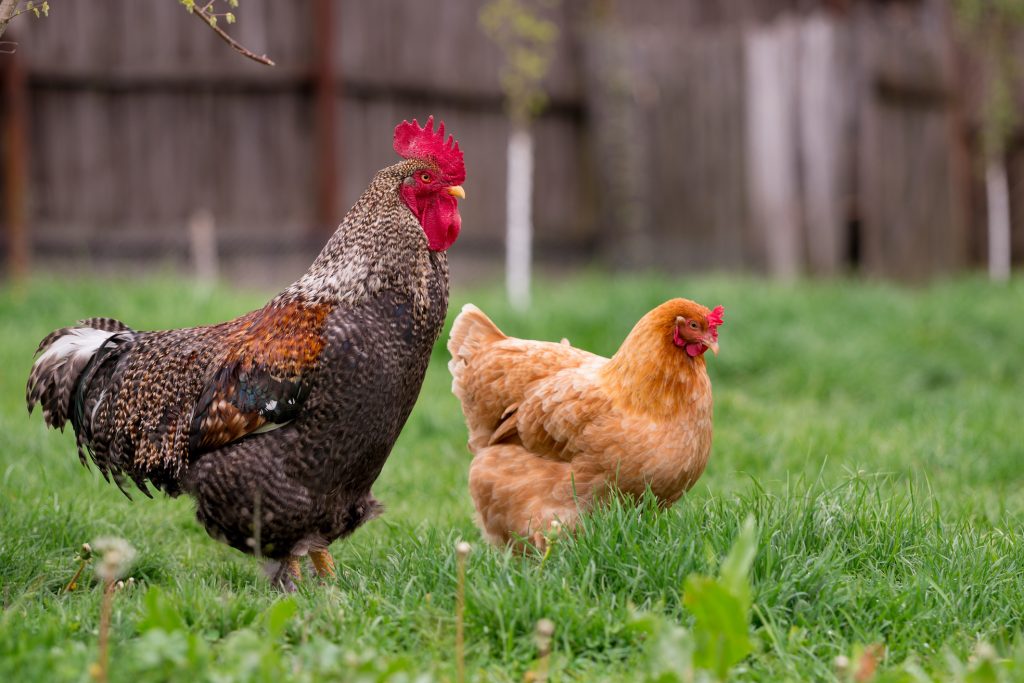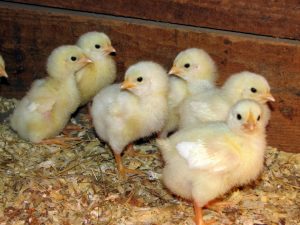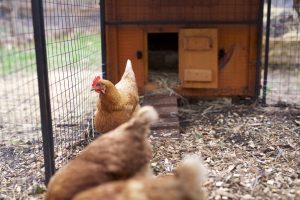Birds of a Feather
Raising chickens in your backyard
 Every morning, Kate Etherington, President & Executive Director of Willistown Conservation Trust, heads down to her barn to check on the chickens, making sure they have food, fresh water and a clean coop. Weather permitting, she lets them roam in their outdoor run, enclosed with chicken wire to keep out foxes, while she does her daily chores. When she can’t let the chickens out, she makes sure to give them treats and veggie scraps to make up for it.
Every morning, Kate Etherington, President & Executive Director of Willistown Conservation Trust, heads down to her barn to check on the chickens, making sure they have food, fresh water and a clean coop. Weather permitting, she lets them roam in their outdoor run, enclosed with chicken wire to keep out foxes, while she does her daily chores. When she can’t let the chickens out, she makes sure to give them treats and veggie scraps to make up for it.
While Etherington has many animals on her small farm in Easttown Township, there’s something special about chickens. “I think they’re interesting. I love letting them out and watching them forage,” she said. “We get eggs every day, which is lovely, especially in times of egg shortages. It’s great to have that connection between something you’re taking care of and an actual food source.”
Etherington is among a growing number of chicken owners. Around 13% of U.S. households have chickens, with an estimated 85 million birds among them. Celebs like Jennifer Garner, David and Victoria Beckham, and even Prince Harry and Meghan Markle are raising flocks.
Wondering what all the cluck’s about? Read on for a crash course on backyard chickens!
Why Chickens?

Torey Fischer, a Penn State Extension poultry educator, first noticed an increased interest in chickens during the pandemic, when people were spending more time at home. More recently, she’s seen spikes in interest due to rising egg prices. But she attributes much of chickens’ lasting popularity to the larger increase in homesteading, a self-sufficient lifestyle focused on producing your own food. “People want to be more involved in the process and connected to where their food comes from,” she said. “Unlike domesticated pets, there’s the perk of having those eggs as well.”
That said, don’t get your hopes up about saving money at the grocery store. “Eggs are an added benefit, but don’t start raising chickens expecting it to be cheaper than the store after factoring in the cost of equipment, birds, feed and healthcare,” Fischer said.

In addition, many people are drawn to chickens for the same reasons they have other pets. “People enjoy caring for and interacting with the birds,” Fischer said. “If you have kids, you can get them involved. It’s a great educational experience, teaching kids how to care for an animal, budgeting and responsibility.”
Etherington can attest to that. “It’s a fun family thing to do,” she said. “The kids get to pick out different breeds that lay different color eggs. Instead of a lemonade stand, they set up a little farmstand at the end of the driveway.”
Getting Started

Considering starting your own flock of feathered friends? First, be sure to check your local ordinances. Many boroughs and townships have restrictions on chickens in residential areas. The Borough of West Chester, for example, updated their regulations last spring. Hens (no roosters allowed, obviously) must be kept in a fully enclosed shelter, providing at least 2 square feet per bird, with a covered, fenced enclosure that must be in the backyard. Chickens must be kept at least 5 feet from the property line and at least 25 feet away from buildings.
Fischer stressed the importance of planning ahead. “Many people see cute chicks in the store and get excited. But the process is a lot easier when you do some planning in advance,” she said. If you’re raising chicks, make sure to have your brooder — a safe, warm space for chicks to grow — set up in advance, complete with a heat lamp, thermometer and bedding (wood shavings, shredded paper and hemp are good options).

Whether you’re raising chicks or starting with mature hens, you’ll want to have your coop and run (an outdoor space enclosed with chicken wire and a mesh or solid roof) ready before bringing your birds home. Chickens need adequate shelter, both from the elements and predators like foxes and hawks. They also need enough space. Penn State Extension recommends at least 1 to 3 square feet of indoor space in the coop per bird and 5 to 10 feet of outdoor space in the run per bird. “If you think you’ll ever expand in the future, build a bigger coop initially,” said Fischer. Be aware of “chicken math” — while you may start with just a few hens, you might find yourself growing your flock more than originally planned!
Lastly, while chickens are considered relatively low-maintenance pets, caring for any animal is a serious commitment. “We’re all busy people, and we don’t always feel like schlepping out to the chicken coop,” said Etherington. “It can be challenging to make time, but it’s a good way to make sure you’re outside every day.”
Whether for yard-to-table eggs or simply companionship, chickens can be an egg-cellent addition to your family. Happy hatching!
About Bird Flu
You’ve probably heard about the current outbreak of bird flu, aka highly pathogenic avian influenza (HPAI). Here are a few things to know about the virus.
First and foremost, make sure you’re getting reliable information. Penn State Exension’s Torey Fischer warned, “Be cautious when looking for information on social media. Try to look for scientific sources to confirm that information — websites ending in .gov or .edu are good places to start.” Fischer also recommends contacting the Penn State Poultry Extension team, Extension.PSU.edu/Poultry.

There are also important biosecurity measures you can take to protect yourself and your flock. Prevent contact with wildlife, especially wild birds and waterfowl, by keeping your chickens indoors when possible. “Birds outside have a higher risk of exposure. If you’re letting them outside, keep them fenced in and cover outdoor runs with a roof or netting,” said Fischer.
Avoid spreading contaminants by wearing dedicated clothes and shoes when working in your coop. When introducing new chickens to your flock, be sure to source your birds safely. Be wary of Facebook groups, and look for breeders certified through the National Poultry Improvement Plan (NPIP), which requires testing for certain diseases. Experts recommend quarantining new birds for at least 30 days, monitoring for signs of illness.
Finally, if you suspect any of your chickens are showing signs of infection, including respiratory, gastrointestinal and neurological symptoms, contact the Pennsylvania Department of Agriculture emergency hotline, 717-772-2852.
Our Favorite Resources
- Berk Hathaway Holly Gross
- Berk Hathaway Country Prop
- Chester Cty Community Fdn
- Chester Cty Hosp, Penn Med
- Chester Cty Library System
- Colonial Theatre
- Delaware Museum of Nat & Sci
- Key Financial, Inc.
- King Construction
- Mercedes Benz
- Osher Lifelong Learning
- Ron’s Original
- Tim Vaughan
- West Chester BID
- Walter J. Cook
